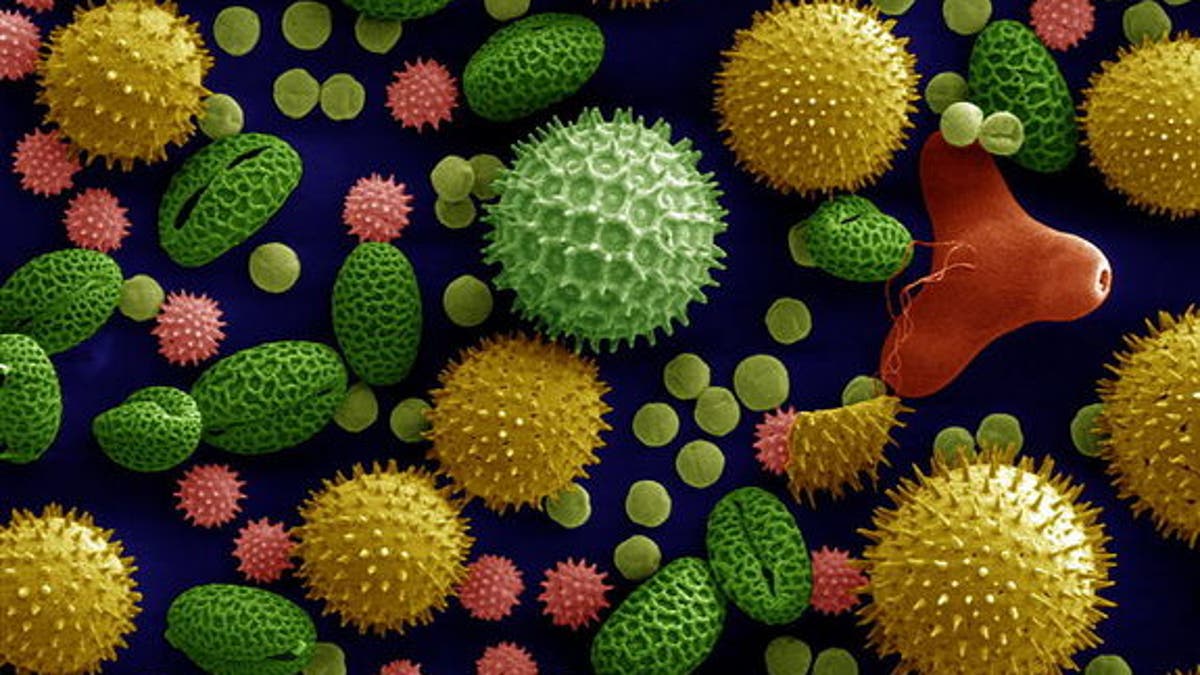
False color scanning electron microscope image of pollen grains from a variety of common plants: sunflower, morning glory, prairie hollyhock, oriental lily, evening primrose and castor bean. (Public domain image (created by the Dartmouth Electron Microscope Facility))
First, America had to suffer through a bone-chilling "Polar Vortex" to get to spring. But now that the warm weather's finally here, there's a new headache to deal with -- literally. Beware the "Pollen Vortex."
According to doctors, this year's long, brutal winter may mean the country's headed for pollen eruption and a harsh allergy season in the spring.
The freezing temperatures of the prolonged winter may have delayed the blooming of trees, and now that it's finally warming up, trees are expected to bloom at the same time as grasses, causing a dramatic rise in pollen, allergy experts said.
"People who may have both tree allergies and grass allergies are probably going be doubly impacted, because both of those things are going to be blooming at the same time," said Dr. Lolita McDavid, a pediatrician at University Hospitals Rainbow Babies & Children's Hospital in Cleveland, Ohio. [The 5 Most Common Allergies]
About 8 percent of U.S. adults suffer from seasonal allergies, according to the Centers for Disease Control and Prevention. Symptoms of these allergies typically include stuffy and runny noses, watery and itchy eyes, sneezing, and wheezing, especially on days with high pollen counts.
"The allergy seasons seem to be getting intense in the last few years. We are not quite sure why," McDavid said. "We don't know if it's the climate change. It may be."
Some doctors also contend that people have more allergies today perhaps because they are less exposed to allergens, such as pollen, than they used to be, McDavid said. "We used to get exposed to all kinds of things. We didn't have air conditioning, or air filtration systems."
The severity of each year's allergy season depends on the temperatures, precipitation and amount of flowering grasses in an area that year, studies have shown.
This year, in addition to low temperatures, heavy precipitation in many areas of the country, especially in March, may have temporarily suppressed pollen release. But that same precipitation may have actually encouraged the growth of trees and grass, resulting in greater pollen release later in the season, experts said.
On top of the rain and humidity, melting of the recent snow is also contributing to mold growth, which can worsen allergies, McDavid said.
To fight off an intense allergy season, McDavid suggests people who have allergies change their clothes when they get home, so that they don't walk around the home with the pollen they brought in.
Experts also recommend people wash their hair before getting in bed.
"If you have pollen on your hair and you're sleeping on a pillow, you're basically putting your face back down in the pollen," McDavid said.
On days with high temperatures and high pollen counts, McDavid suggested people with allergies close the windows and turn on air conditioning.
Lastly, people can take an antihistamine before going to bed, which helps prevent allergic reactions for 24 hours.
"You can take them at night, so that you won't be drowsy in the day," McDavid said.
Copyright 2014 LiveScience, a TechMediaNetwork company. All rights reserved. This material may not be published, broadcast, rewritten or redistributed.
